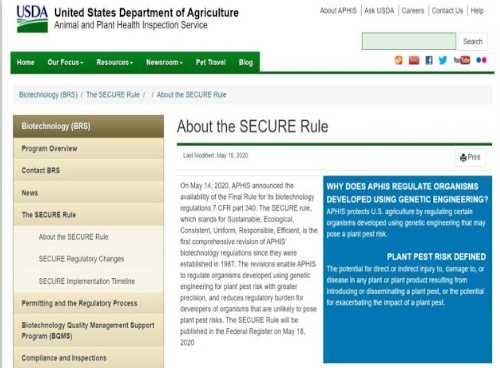By Shelbi Knisley
On May 18, 2020, USDA and its Animal and Plant Health Inspection Agency (APHIS) published revised rules intended to modernize its regulatory system on genetically engineered organisms and other breeding technologies through a science-based system.
USDA said this new rule will help give U.S. farmers access to these critical tools “to help increase agricultural productivity and sustainability, improve the nutritional value and quality of crops, combat pests and diseases, and enhance food safety. This new rule signals to the world that the United States is focused on risk assessments based on science to give proper oversight to these new technologies.

USDA’s Animal and Plant Health Inspections Service has introduced a new regulatory system for evaluating new plant traits derived from transgenic and gene editing technologies. The SECURE Rule was published in The Federal Register May 18.
In particular, the rule seeks to address products that are developed through gene editing, which is of great interest to U.S. wheat producers. Gene edited products may be exempt from strict regulation so long as no “plant pest” is present, and the products could be produced through traditional breeding methods. While many in the industry are working to determine exactly how much of these exemptions will apply to wheat breeding, the approach is similar to that taken by other countries such as Argentina, Australia, Brazil, Canada, Chile, Colombia, Israel and Paraguay.
While of smaller interest to U.S. wheat customers, as there have been no genetically modified (GM) traits commercialized in wheat in the United States, the rule also adjusts the existing regulatory structure for GM plants. Those adjustments will make it easier for companies to bring to market GM plants with the same plant and trait combinations that USDA has previously reviewed.
Click here to see more...